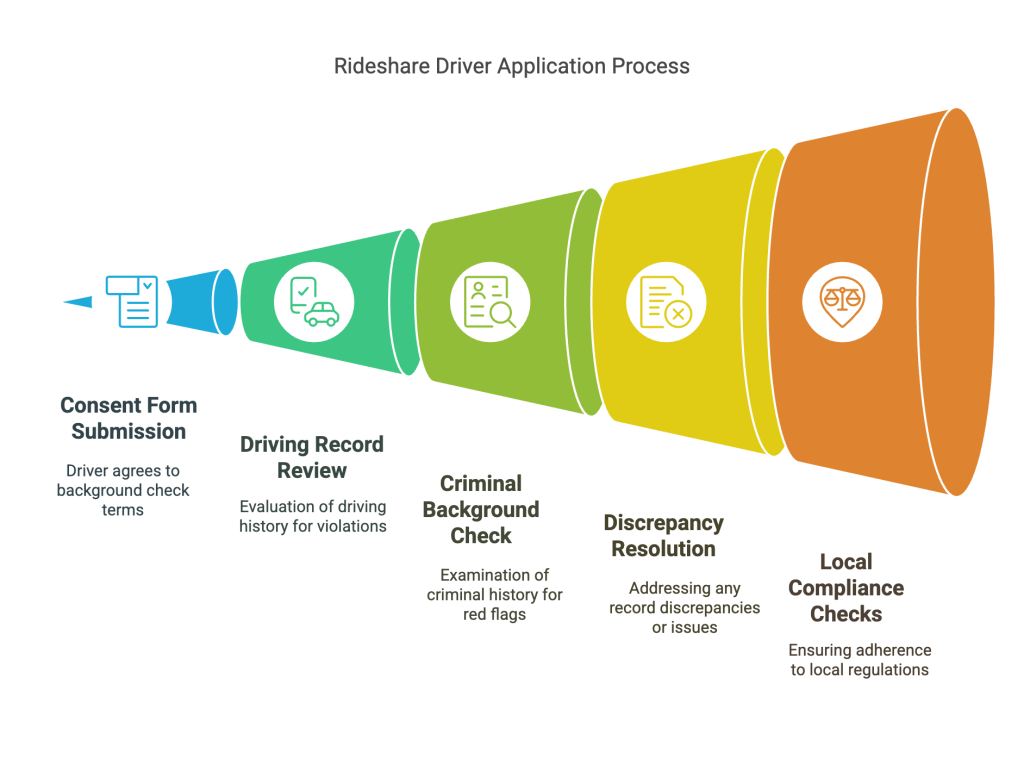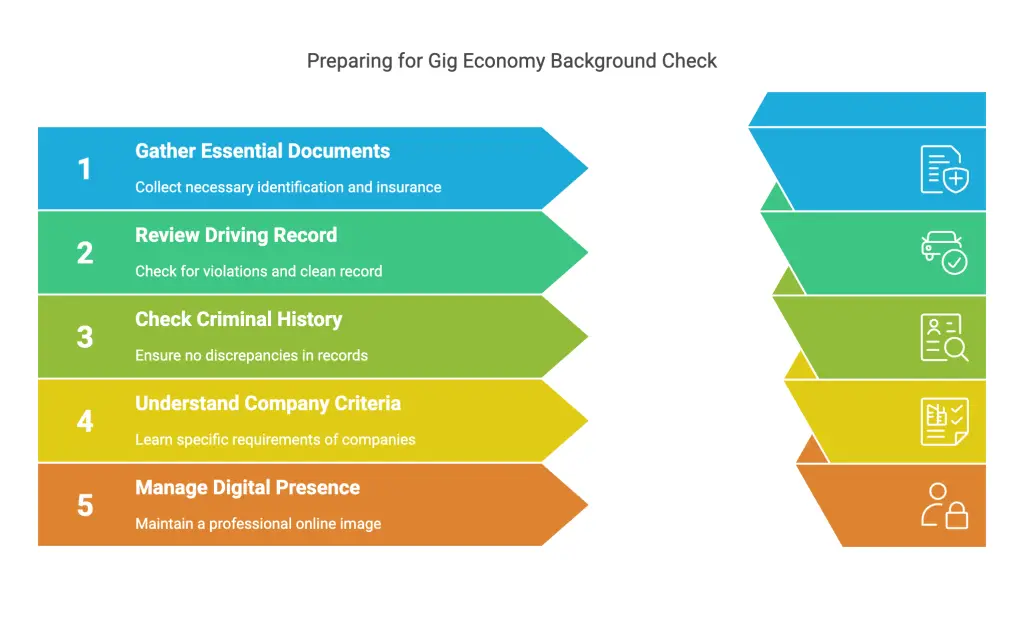The gig economy is thriving, and in Michigan, opportunities abound for those looking to capitalize on flexible working hours offered by companies like Uber, Lyft, and various food delivery services. But before you hit the road, it's crucial to understand the background check process that ensures safety and compliance in this industry.
This guide explores the necessary steps for Michigan gig economy background checks, focusing on rideshare and food delivery services. Whether you're an aspiring driver or an industry insider, this information is vital for navigating the screening landscape.
Key Takeaways
- The gig economy in Michigan is expanding rapidly, drawing workers to flexible opportunities in ridesharing and delivery services.
- Background checks are crucial in ridesharing and delivery roles, ensuring safety and trust for both drivers and customers.
- To drive for Uber or Lyft, expect a review of your driving and criminal records, with clean histories being key to approval.
- Food delivery services like DoorDash and Uber Eats also run background checks but may have different requirements tailored to delivery tasks.
- Preparing for a background check involves organizing necessary documents and reviewing personal driving and criminal records.
Introduction
The gig economy is booming, and Michigan is no exception. It's a magnet for workers who prefer flexible schedules, evident from the growing numbers in ridesharing and food delivery gigs. You're probably seeing people flocking to companies like Uber, Lyft, and DoorDash. This surge isn't just about flexible hours but also stems from the increased demand for convenient services.
In this context, understanding the background check process becomes pivotal. If you're pondering a gig with these companies, grasping the screening process is essential. Think of it as a gatekeeper of sorts—balancing opportunity with accountability. This isn't just bureaucracy; it's about securing the safety of everyone involved, from passengers to drivers.
As you consider jumping into the Michigan gig economy, be ready for some essential requirements. This guide will walk you through what's needed, why it matters, and how you can navigate these requirements with confidence. Whether you're new to this or have been around, these insights are crucial to moving forward smartly.
Understanding the Gig Economy in Michigan
The gig economy is a broad term for a labor market characterized by short-term contracts or freelance work. In Michigan, this includes ridesharing, food delivery, and various other service-based roles. Companies like Uber, Lyft, DoorDash, and Postmates have created opportunities for flexible work outside traditional 9-to-5 settings.
Ridesharing in Michigan has seen significant uptake, especially in cities like Detroit, Ann Arbor, and Grand Rapids. Many drivers appreciate the ability to set their own schedules. On a similar note, food delivery services tap into a growing demand for convenience, benefiting both drivers seeking extra earnings and consumers looking for quick access to meals.
The growth in this sector is evident. A report from the Bureau of Labor Statistics indicated a steady rise in independent contractor roles, with a notable portion concentrated in transportation and material moving sectors. Between 2010 and 2020, employment in these areas grew significantly, with expectations for continued expansion in the coming years.
As you consider joining this evolving field, keep in mind the dynamic landscape and opportunities presented. Whether you're eyeing a career change or seeking supplemental income, understanding the gig economy's scope and scale in Michigan can provide a clearer path forward. Have you thought about which gig service fits your lifestyle best?
Importance of Background Checks in the Gig Economy
Background checks serve as the backbone of safety and trust in the gig economy. For rideshare and delivery services, they ensure that drivers and couriers are reliable and safe. This is especially important when considering the direct interaction gig workers have with passengers and customers in Michigan.
While safety remains a top priority, legal compliance plays an equally critical role. Federal mandates, such as those outlined in the Fair Credit Reporting Act, require thorough screenings. On the state level, Michigan enforces specific criteria that must be met to comply with its regulations. These requirements help filter out applicants with concerning histories, fostering a safer community for everyone involved.
Consider this: you hop into a car with a stranger or expect your meal to reach you safely. Knowing that background checks are in place eases these interactions. Without them, the risk increases, and consumer trust diminishes. Effective background checks are what make many feel secure about leveraging rideshare and delivery services, knowing there’s a system aimed at protecting their well-being.
Next time you open an app or place an order, remember the unseen processes working to keep you safe. They're not just bureaucratic steps; they're practical measures goal-oriented to minimize risk and maintain trust within the gig economy.
Rideshare Screening: Uber and Lyft
Applying to drive for Uber or Lyft in Michigan involves a straightforward, yet thorough background check. First up, you submit your application online, which includes a consent form for the background check. Uber and Lyft both partner with a third-party service to review your history.
The screening process dives into your driving record and criminal background. You need a clean driving history—few or no traffic violations are crucial for approval. DUIs, reckless driving, or multiple minor infractions could lead to disqualification. A sound criminal record is equally important. Expect the check to reach back at least seven years. Felonies, violent crimes, or sexual offenses are major red flags.
Candidates sometimes face challenges. For instance, discrepancies can arise between old records and current legal standings. Say you had an expunged record—double-check that your record reflects this change. Misinformation or outdated info can stall your application. If your background check returns unwanted surprises, contact the reporting agency to clear things up.

Each city or county in Michigan may add layers to the process—local laws might necessitate extra checks. Be prepared for these steps. All said, patience and a bit of diligence can keep things moving smoothly. Working with Uber or Lyft in Michigan can be a rewarding experience if you clear the path with a clean record.
Food Delivery Checks in Michigan
Food delivery services like DoorDash, Grubhub, and Uber Eats have specific background check requirements to ensure reliability and safety. In Michigan, these checks are similar to those for rideshare drivers, but there are distinct elements tailored to food delivery.
You can expect the standard vetting process to involve a review of your driving record and a criminal background check. Delivery services typically want a clean driving record over the past few years. Severe infractions like DUI or reckless driving can be red flags. On the criminal side, convictions involving violence or theft are scrutinized closely, as drivers handle not just transportation but also goods.
Unlike rideshare services, delivery checks might not require a vehicle inspection since you're not transporting passengers. However, vehicle requirements must be met. For example, some companies stipulate a minimum vehicle model year or condition standards.
The differences in check processes mostly lie in these minor nuances, reflecting the varied nature of tasks between transporting people versus delivering food. Understanding your specific service's requirements saves you time and effort, ensuring you meet all necessary criteria before hitting the road.
How to Prepare for a Gig Economy Background Check
You'll want to start by gathering essential documents. Make sure you have your driver's license, proof of insurance, and vehicle registration ready. These are typically required for any driving position. Having them organized ahead of time can save you stress and speed up the process.
Next, take a proactive approach to understanding your own record. This means reviewing your driving history and checking for any traffic violations that might be flagged. You can access your driving record through your state's Department of Motor Vehicles (DMV) website. It's worth noting that Uber and Lyft, among others, place a lot of emphasis on a clean driving record.
Don't forget to consider your criminal record if applicable. Companies will look at this to ensure passenger and community safety. You can check your criminal history through various online services or local government offices. If you find any inaccuracies, it's important to address them before starting your application.
Preparation also involves understanding the criteria companies use beyond basic qualifications. For instance, some services might require a minimum number of years of licensed driving experience. Confirm these requirements by visiting the company’s website or consulting their help sections.
Finally, think about your digital presence. Some companies might check your social media or online profiles. Keep a professional image online; it can influence your chances of passing their checks.

Preparation is half the battle. By being organized and informed, you can face the screening process with confidence and increase your chances of success.
Legal Rights and Employer Responsibilities
You have certain rights when undergoing a background check as a gig worker. The Fair Credit Reporting Act (FCRA) provides a framework to protect you during this process. Companies must notify you in writing before they can obtain your background report. If they find information that might influence their decision not to hire you, they should share it with you, along with a copy of the report. This gives you the chance to review and dispute any inaccuracies.
Employers also have responsibilities under the FCRA. They must ensure the process is fair and transparent. This includes obtaining your permission to conduct the check and respecting your rights to privacy. If a decision is made based on the report, they are required to inform you and provide information on how to dispute the findings with the reporting agency.
Understanding these aspects can empower you during your job search in the gig economy. Knowledge of your rights not only protects you but also ensures companies adhere to ethical hiring practices. Are you aware of the full scope of your rights under the FCRA, and do you know how to assert them when necessary?
Additional Resources
Using the right resources can make or break your experience with background checks for gig economy roles. Begin with internal resources that companies often provide. For instance, some gig platforms have dedicated blogs sharing tips specific to their background check procedures. These blogs are typically a treasure trove of tailored advice, reflecting the most recent policy changes or common pitfalls applicants face.
Don't stop there. Look beyond the internal resources. The Federal Trade Commission (FTC) is a solid starting point. Their guidelines on background checks lay out the fundamentals of your rights during the process under the Fair Credit Reporting Act. Knowing your rights ensures you aren’t left in the dark if discrepancies arise.
County or state websites often offer portals for checking your legal and driving records. They might also provide context on how to interpret these records, which is crucial if questions pop up in your application. Some states even offer online systems for quickly accessing your own driving history, which could be pivotal if you’re a frequent applicant.
Explore forums and online communities where drivers share their screening experiences. Real-world insights and recent challenges discussed there can guide you better than a generic article or company FAQ. They might help you fast-track your preparation process.
Don’t forgo considering professional services. For those daunted by handling public records or legal jargon, professional background check services offer to run personal checks before you submit an application. This can expose potential red flags early, letting you address them ahead of time.
Conclusion
Essential components of preparing for Michigan's gig economy background checks include gathering the right documents and understanding your own records. Armed with a driver’s license, proof of insurance, and vehicle registration, you're on solid footing. Taking the time to review your driving and criminal history can see you ahead of the curve and prevent unwelcome surprises.
A successful career in ridesharing or delivery depends on being informed and proactive. Stay updated on screening requirements; it's your key to thriving in this flexible job market. Whether you're driving for Uber or delivering food, preparation sets you apart. Keep on top of changes and ensure you're always ready to hit the road.
Frequently Asked Questions (FAQs)
What disqualifies you from Uber in Michigan?
You can be disqualified from driving for Uber in Michigan if you have certain criminal convictions, a violent crime history, sexual offenses, or pending cases. Serious driving offenses or having more than three minor violations in the last three years can also disqualify you.
Does Lyft check criminal history in MI?
Yes, Lyft conducts a thorough background check that includes reviewing your criminal history in Michigan. They aim to ensure passenger safety by evaluating applicants for violent crimes, sexual offenses, and other major felonies.
Can a DUI affect gig work in Michigan?
A DUI can impact your eligibility for gig work, particularly with driving and delivery services like Uber, Lyft, and DoorDash. These companies often disqualify drivers with recent DUI convictions.
How often do gig companies recheck backgrounds in MI?
Many gig companies, such as Uber and Lyft, conduct annual background checks to ensure ongoing compliance with their safety standards.
Are MI gig workers considered employees?
In Michigan, most gig workers are classified as independent contractors rather than employees. This status affects benefits, taxes, and legal protections they receive.
Can you appeal a gig background check denial in MI?
Yes, you can appeal a background check denial. Typically, companies will provide instructions on how to dispute inaccuracies in your report, allowing you to present evidence or request further review.
Do gig companies check credit history in Michigan?
Most gig companies do not check your credit history because it is not relevant to the nature of gig work. They focus more on background checks for criminal and driving records.
How far back do Uber checks go in MI?
Uber's background checks in Michigan generally look back seven years. However, they may consider more severe offenses that fall beyond this timeframe.
Are misdemeanors a problem for gig work in MI?
Misdemeanors can affect your ability to work with certain gig companies, especially if they involve theft, violence, or driving offenses. Each company has different policies.
Do delivery drivers need fingerprinting in Michigan?
Generally, fingerprinting is not required for delivery drivers in Michigan through companies like UberEats or GrubHub. They primarily rely on standard background checks.
What driving record issues can affect my gig work application in MI?
Having a suspended license, recent reckless driving, and multiple minor violations can prevent you from being approved for driving gigs.
Does Uber in Michigan require special insurance for drivers?
Uber requires drivers to have personal insurance that meets state minimums, and they provide additional coverage when you are on the app and accepting rides.
Are there age requirements for gig work in Michigan?
Yes, most driving and delivery gig platforms require you to be at least 18 years old, with some requiring a minimum age of 21.
Can felons work for gig companies in Michigan?
Felons may face challenges working for gig companies like Uber and Lyft due to their strict background checks, but each case is reviewed individually depending on the nature and time since the offense.
Definitions
Background Check
A background check is a process employers use to verify information about you before hiring. This usually includes reviews of your criminal history, driving record, and sometimes credit reports. For roles like rideshare driving or food delivery, companies want to know if you have a safe and reliable track record. If you’ve had issues in the past, you’re allowed to review and dispute the report.
Gig Economy
The gig economy is made up of short-term, flexible jobs instead of traditional full-time work. These jobs often come through platforms like Uber, Lyft, and DoorDash. Most gig workers act as independent contractors, not employees. That means you set your schedule, but you're also responsible for things like your taxes and insurance. This setup works well for people looking for part-time income or more control over their time.
Independent Contractor
An independent contractor is someone who provides services to a company but isn’t legally considered an employee. You run your own business in a sense—you’re in charge of your hours, taxes, and tools. In the gig economy, most drivers for Uber, Lyft, and delivery services fall into this category. The company doesn’t withhold taxes or offer benefits, but you get more flexibility.
Fair Credit Reporting Act (FCRA)
The Fair Credit Reporting Act is a federal law that protects your rights during background checks. It requires companies to get your permission before running a report and to inform you if something in the report affects their decision. You have the right to see what's in the report and challenge any mistakes. This law keeps the screening process fair and transparent.
Driving Record
Your driving record includes details of your driving history—like traffic violations, license status, and any past accidents. Companies check this to decide if you're safe behind the wheel. A clean record improves your chances of being approved to drive for rideshare or delivery platforms. You can request a copy of your record from your state’s Department of Motor Vehicles.

GCheck Editorial Team
Meet the GCheck Editorial Team, your trusted source for insightful and up-to-date information in the world of employment background checks. Committed to delivering the latest trends, best practices, and industry insights, our team is dedicated to keeping you informed.
With a passion for ensuring accuracy, compliance, and efficiency in background screening, we are your go-to experts in the field. Stay tuned for our comprehensive articles, guides, and analysis, designed to empower businesses and individuals with the knowledge they need to make informed decisions.
At GCheck, we're here to guide you through the complexities of background checks, every step of the way.





